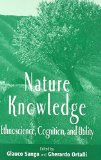

 |

|

Sold Out
Book Categories |
| Introduction | 1 | |
| Pt. I | Classification | |
| Recognition and classification of natural kinds | 23 | |
| 1 | How a folk botanical system can be both natural and comprehensive : one Maya Indian's view of the plant world | 38 |
| 2 | Arbitrariness and necessity in ethnobiological classification : notes on some persisting issues | 47 |
| 3 | Tackling Aristotelian ethnozoology | 57 |
| 4 | Current and historical problems in classification : levels and associated themes, from the linguistic point of view | 68 |
| Discussion | 95 | |
| Pt. II | Naming | |
| The ways of naming nature and through nature | 105 | |
| 5 | The role of motivation ("iconymy)" in naming : six responses to a list of questions | 108 |
| 6 | Tapir and squirrel : further nomenclatural meanderings toward a universal sound-symbolic bestiary | 119 |
| 7 | Jivaro streams : from named places to placed names | 128 |
| 8 | What is lost when names are forgotten? | 161 |
| 9 | Examples of metaphors from fauna and flora | 185 |
| 10 | Lexicalization of natural objects in Palawan | 191 |
| 11 | Levels and mechanisms of naming | 201 |
| Discussion | 221 | |
| Pt. III | Thought | |
| The symbolic uses of nature | 229 | |
| 12 | Thought of nature and cosmology | 231 |
| 13 | Symbolic anthropology and ethnoscience : two paradigms | 239 |
| 14 | Doing, thinking, saying | 243 |
| 15 | Thought, knowledge, and universals | 249 |
| 16 | Bodily humors in the scholarly tradition of Hindu and Galenic medicine as an example of naive theory and implicate universals | 262 |
| Discussion | 272 | |
| Pt. IV | Use | |
| How have we come to use nature, from a practical point-of-view? | 283 | |
| 17 | Indigenous knowledge : subordination and localism | 287 |
| 18 | Indigenous environmental knowledge, the history of science, and the discourse of development | 297 |
| 19 | Two reflections on ecological knowledge | 301 |
| 20 | Indigenous knowledge and cognitive power | 312 |
| 21 | The role of indigenous knowledge systems in facilitating sustainable approaches to development | 317 |
| Discussion | 331 | |
| Pt. V | Conservation | |
| What does it mean to conserve nature? | 339 | |
| 22 | Random conservation and deliberate diffusion of botanical species : some evidence out of the modern European agricultural past | 354 |
| 23 | Diversity, protection, and conservation : local agricultural products and foodstuffs | 366 |
| 24 | Cultural research on the origin and maintenance of agricultural diversity | 379 |
| 25 | Activation practices, history of environmental resources, and conservation | 386 |
| 26 | Forms of knowledge in the conservation of natural resources : from the Middle Ages to the Venetian "tribe" | 391 |
| Discussion | 399 |
Login|Complaints|Blog|Games|Digital Media|Souls|Obituary|Contact Us|FAQ
CAN'T FIND WHAT YOU'RE LOOKING FOR? CLICK HERE!!! X
 You must be logged in to add to WishlistX
 This item is in your Wish ListX
 This item is in your CollectionNature Knowledge: Ethnoscience, Cognition, and Utility
X
 This Item is in Your InventoryNature Knowledge: Ethnoscience, Cognition, and Utility
X
 You must be logged in to review the productsX
 X
 X

Add Nature Knowledge: Ethnoscience, Cognition, and Utility, Numerous scholars, in particular anthropologists, historians, economists, linguists, and biologists, have, over the last few years, studied forms of knowledge and use of nature, and of the ways nature can be protected and conserved. Some of the most promi, Nature Knowledge: Ethnoscience, Cognition, and Utility to the inventory that you are selling on WonderClubX
 X

Add Nature Knowledge: Ethnoscience, Cognition, and Utility, Numerous scholars, in particular anthropologists, historians, economists, linguists, and biologists, have, over the last few years, studied forms of knowledge and use of nature, and of the ways nature can be protected and conserved. Some of the most promi, Nature Knowledge: Ethnoscience, Cognition, and Utility to your collection on WonderClub |